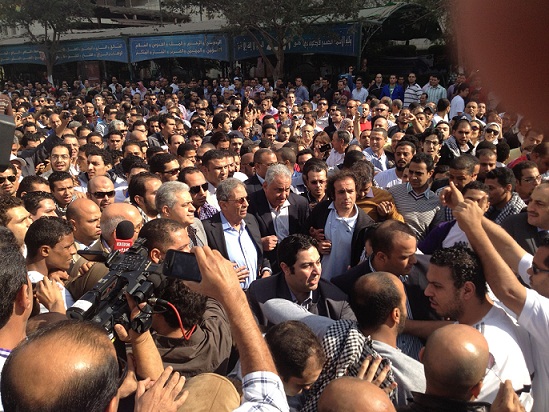JERUSALEM: Israel’s security cabinet was meeting on Wednesday to reportedly consider an international proposal for significantly easing its Gaza blockade after weeks of mounting global pressure.
The 15-member body was expected to vote on a proposal put together over several weeks of intense consultations between Israeli Prime Minister Benjamin Netanyahu and Mideast Quartet envoy Tony Blair, the Haaretz daily reported.
The security cabinet began meeting early on Wednesday for what was understood to be a debate on "matters related to Gaza," a government official said without providing further details.
If approved, the "Blair-Netanyahu understandings" would see Israel adopt a new approach to those goods which have been kept out of Gaza since the blockade was imposed in 2006, Haaretz and other media outlets reported.
Under the new proposal, thrashed out in three face-to-face sessions with Blair as well as multiple telephone calls, Israel would allow in everything — except for items on a "blacklist," the paper said.
It would also allow for the entry of more building materials for UN-sponsored construction projects.
And it would see Israel agreeing to examine a proposal for stationing EU and Palestinian Authority inspectors at the border to inspect incoming goods, Haaretz said.
Currently thousands of products — some as banal as toilet paper and ginger — are listed by Israel as constituting a ‘security’ risk and therefore are prevented from reaching Gaza.
The list also includes products such as construction materials, which Israel fears could be used for building rockets — such metal piping — and cement which could be used for building bunkers.
Palestinian border official Raed Fatuh said on Wednesday that Israel had allowed eight trucks loaded with kitchen supplies to enter Gaza for the first time since the closures were imposed in 2006.
The move follows similar recent decisions to allow in snack foods and other previously banned household items. Fatuh said Israel was currently allowing in some 140 items, compared with 4,000 before the closures.
Israeli media said the proposal was widely expected to be approved by the security cabinet, with Blair telling Haaretz it was "a very important step."
"It will allow us to keep weapons and weapon materials out of Gaza, but on the other hand to help the Palestinian population there," said Blair, who represents the Middle East peace Quartet of the United States, the United Nations, the European Union and Russia.
"The policy in Gaza should be to isolate the extremists but to help the people," he added.
Blair told the paper the ultimate aim was to eradicate the need for smuggling through a network of tunnels running under Gaza’s border with Egypt, through which thousands of goods are brought daily and sold at inflated prices.
However, army radio said Netanyahu was expected to stress the naval blockade of Gaza would remain in place — a measure he said was crucial for preventing Gaza from "turning into an Iranian port" through which arms would flow freely.
Earlier this week, a European Union diplomat meeting regional foreign ministers in Luxembourg had confirmed Israel was preparing to ease the blockade significantly, going "from a positive list to a negative list."
Israel has been facing mounting calls to lift the blockade following a deadly May 31 raid on an aid flotilla trying to run the Gaza blockade, in which nine Turkish activists were shot dead by navy seals.
It has argued the closures — imposed when an Israeli soldier was seized by Gaza in a deadly June 2006 raid and tightened a year later when Hamas took over — are needed to contain the Islamist movement.
As the government mulled easing the blockade, the Israeli committee for investigating the botched naval operation — known as the Tirkel Commission — was on Wednesday to begin its probe, media reports said.
The three-man committee, joined by two foreign observers, will look into the legal aspects of the operation in a move dismissed as insufficient by both Turkey and Palestinian leader Mahmud Abbas.

